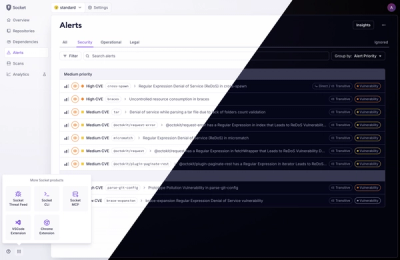
Product
A Fresh Look for the Socket Dashboard
We’ve redesigned the Socket dashboard with simpler navigation, less visual clutter, and a cleaner UI that highlights what really matters.
A JavaScript library for applying asynchronous calls to an API.
npm install --save applyq
Lets say there is a JavaScript object on the page but it is unknown where and when it will be loaded. However, you would like to have the possibility to interact with it at any place on the page. The asynchronous syntax makes it possible to call the API before its loaded.
The asynchronous syntax uses a queue, which is a first-in, first-out data structure
that collects API calls until the target object is ready to execute them.
To push an API call onto the queue, you must convert it from the traditional
JavaScript syntax into a command array. Command arrays are simply JavaScript
arrays that conform to a certain format. The first element in a command array is
the name of the object method you want to call. It must be a string. The rest of
the elements are the arguments you want to pass to the object method. These can
be any JavaScript value.
The following code calls logger.log using the traditional syntax:
logger.log('Hello world!');
The equivalent code in the asynchronous syntax:
window._loggerq = window._loggerq || [];
_loggerq.push(['log', 'Hello world!']);
Once the object is loaded and initialized, it has to execute the queued command
arrays. This can be done by calling applyq:
var logger = new Logger();
applyq(logger, _loggerq);
After the object had been initialized, there is no need to store the commands
anymore. The commands can be executed right away. That's why after calling applyq
the push method of the commands queue is overridden. The overridden version of
push is executing the command arrays immediately instead of storing them.
You might want to process a subset of commands only. In that case you can path the list of commands to process:
/* In this case only commands passed to the register() method will be processed */
applyq(server, _serverq, ['register']);
Some of the explanations of the Asynchronous Syntax were taken from Google Analytics Tracking Basics (Asynchronous Syntax).
MIT
FAQs
A JavaScript library for applying asynchronous calls to an API.
The npm package applyq receives a total of 120 weekly downloads. As such, applyq popularity was classified as not popular.
We found that applyq demonstrated a not healthy version release cadence and project activity because the last version was released a year ago. It has 1 open source maintainer collaborating on the project.
Did you know?

Socket for GitHub automatically highlights issues in each pull request and monitors the health of all your open source dependencies. Discover the contents of your packages and block harmful activity before you install or update your dependencies.

Product
We’ve redesigned the Socket dashboard with simpler navigation, less visual clutter, and a cleaner UI that highlights what really matters.

Industry Insights
Terry O’Daniel, Head of Security at Amplitude, shares insights on building high-impact security teams, aligning with engineering, and why AI gives defenders a fighting chance.

Security News
MCP spec updated with structured tool output, stronger OAuth 2.1 security, resource indicators, and protocol cleanups for safer, more reliable AI workflows.